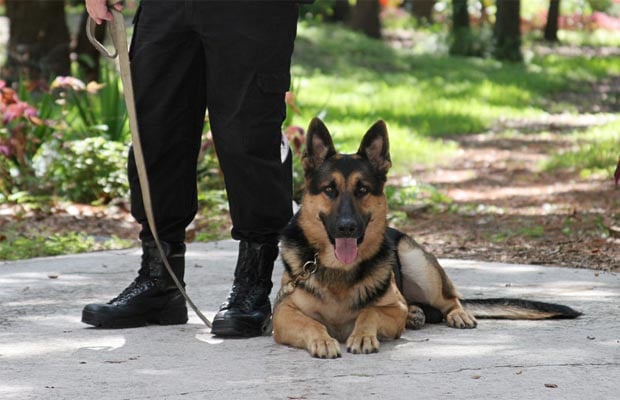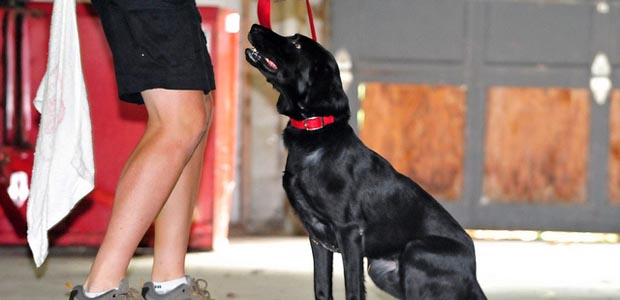
Table of Contents
One of the most rewarding jobs for those who enjoy interacting with both people and dogs is being a dog trainer.
But how does one go about embarking on this career path and acquiring dog trainer certification without any experience?
We've got the answer right here.
Prior to looking into a dog trainer's class, it is important to do a little research and study the industry to make sure that this is the profession best suited for your personality.
While it is not mandated to have a dog trainer certification to actually start training canines for money, it is highly recommended.
Certification proves that you are dedicated to this field and know exactly what you're doing (plus, it makes job hunting slightly easier).
Below, you'll find the what, how, when, and where on all the questions related to becoming a professional dog trainer and getting your dog trainer certification, even if you're a complete newbie in this field.
Dog Trainer Certification: A Guide for Newbies
Certificate vs Certification

Before we begin, it's important to point out the difference between a dog trainer's certificate and a dog trainer's certification because the two are different.
Dog trainer's certificate. When you embark on the journey of getting your Dog Trainer Certificate, this is an educational program that will teach you all the necessary skills on how to train dogs as a professional, work with clients, and work in dog training schools.
There are dog trainer certificate courses, at the end of which you receive a certificate.
However, this doesn't mean that you're 100% qualified to train canines professionally, and this certificate won't carry too much weight on your resume to tip the scale in your favor when looking for a job.
Dog trainer certification. Certification is an actual examination of your knowledge, experience, and skills in the industry and in training dogs as a professional.
In America, there is only one truly serious organization (CCPDT) that can truly assess your suitability for this profession and certify you as a qualified dog trainer.
They will determine if you meet all the necessary criteria and in order to maintain your status, you will also need to continue your education as a professional dog trainer with CCPDT.
Note: Not all certifications are the same, so do your research well – read reviews, talk to people, browse online through websites like APDT's database, etc. Also, remember to always distinguish between a certification with a private dog training school (-no-) and an independent certifying body (-yes-).
Below, we've made a quick checklist of things to do if you feel like dog training is the profession for you and that is something you would like to continue developing your skills in.
To-do list before you get dog trainer certification
1. Research animal behavior science. It is important to understand a dog's cognitive functions, psychology, how an animal learns new things, and so forth simply to be able to create a training program of your own.
When researching articles on this subject, remember to be skeptical and engage your critical thinking skills.
Because of how this information can affect your future career and the canines you'll be working with, ensure the books and articles you read are written by accredited professionals in the field and not self-proclaimed “dog experts.”
2. Read as many books about dog training as you can. There are numerous books on dog ownership, on dog training and on acquiring dog trainer certification written by actual dog trainers and other professionals with strong credentials.
If you're not looking to buy any of these, get to your local library and start there; read a lot about what it really means to be a professional dog trainer and what this occupation entails.
3. Get to know your local dog shelters. One of the best ways to become comfortable with interacting with dogs and people is to volunteer at your local animal shelter(s).
Not only are you able to spend time with dogs on a daily basis, but you are presented with a chance to practice what you may already know and learn how to tweak your dog training and communication skills.
It’s a great way to be around a larger group of unfamiliar canines and find ways of how to properly handle them.
4. Check out local training schools. Alternatively, you can also volunteer at dog training schools, but those are more difficult to get into.
If you're not accepted as a volunteer, enroll your dog in an obedience training class so you can get a feel for what it's like to be a client of a trainer.
Additionally, some canine training schools will allow you to come in and observe how a training class goes, and you can notice the way each dog trainer handles certain situations.
Look up to those dog trainers whose methods you like the most, who promote solid positive reinforcement training and have a great rapport with their clients.
5. Find any other ways to get experience. Aside from trying to get your big break with the help of dog training schools and animal shelters, try to convince your friends or family that you're qualified enough (even without dog trainer certification on your hands yet) to train their dogs.
Establish your own clientele base, even if you have just a couple of dogs to train on the weekends.
The important part is to be able to put down the actual experience on your resume and have good references for the future.
6. Take dog trainer certification classes. This one goes without saying – if you want to be a professional, at some point, you need to invest in professional training.
Additionally, find time to attend dog certification seminars, which will normally be held by your local animal shelters or dog training schools.
The reason these are useful is because they are geared towards dog owners, which expands your knowledge base on how to train pet owners themselves on performing commands for their own dogs.
7. Start your search for a place of work early. Once you have a firm grasp on training and have acquired your dog trainer certification, start looking for canine training schools or animal shelters that are hiring.
Truth be told, it's not easy to get hired when you don't have strong credentials, so you might need to follow the advice listed below.
Nevertheless, when looking to apply your newly acquired dog trainer certification mastery, always ask questions as to how professionals there train dogs and compare if this matches with what you've learned and/or what you're comfortable with.
A new place of work has to be a good fit both ways.
8. A lot of dog trainers start out as apprentices. As with many other trades, this is a great way to learn the ins and outs of your future career under someone who has been doing it for a long time.
Even if you have already acquired your dog trainer certification, this will give you an opportunity to see how a real dog training class goes and start applying some of your knowledge.
While these positions are non-paid or very low-paid, it's still a great start if you are unsure of your dog training abilities and wish for more experience and hands-on training.
Depending on the dog trainer you will be working with as an apprentice, it could take more than 6 months of teaching alongside him before you are ready to venture out on your own.
Once you feel you know what you're doing in terms of training dogs by yourself, and you understand the essence of how this business works – it's time to proceed onto the next big step of your dog trainer's career, and that is your official dog trainer's certificate.
9. Get your dog trainer certification. There are multiple places in America where you can become officially certified as a professional dog trainer (listed below).
You will need to provide proof of your experience, dog training classes, dog certification classes, and take exams. But once you're done with this step, you can consider yourself a professional (who's probably still out of work), and you are already more certified to train canines than half of the other dog trainers in the country who never took the professional training route.
This will give you a boost when looking for a job.
10. Don't stop educating yourself. You must always continue to hone your dog training skills, continue your education, and expand your knowledge of being a professional dog trainer.
Also, remember that once you have received your dog trainer certification, you are actually required to take continuing canine training education classes to maintain your status as an officially certified trainer.

Schools that prepare you to be a dog trainer
More often than not, you don't need any specific school/course to become a dog trainer – most dog trainers are self-taught and use the methods outlined above in the checklist.
What matters is getting the dog trainer certification, which proves that you truly are knowledgeable in the subject as well as experienced. What methods you used do not matter as much as long as the result is “qualified.”
That being said, there's a huge amount of dog trainer schools in the US; most of those courses are provided by the same schools that train dogs and supposedly will hire you if you complete their training (which is not the case more often than not, unfortunately).
The best way is to use Google search with a keyword of your city and check out local training schools if your heart is set on going this way.
Remember that a good dog trainer's school should focus on the following topics:
- Canine behavior and psychology
- General animal learning
- Dog training history
- Dog training class design
You will go through lectures (online or in the school), reading assignments, and practical hands-on experience in training canines.
To put it simply, if you can afford this course and have time to spend as well – go for it! Just don't put all of your eggs in one basket, and do not consider yourself a well-qualified trainer who will be hired immediately simply because you finished a private training school course. Your next step should still be to get a CCPDT dog trainer certification (read below).
Schools that prepare for dog trainer certification
 Just as there are plenty of schools for dog trainers, there are also a lot of schools that can prepare you for dog trainer certification. In fact, there are so many of them that it's pointless to list even just a few (most likely, you'll want to attend your local school).
Just as there are plenty of schools for dog trainers, there are also a lot of schools that can prepare you for dog trainer certification. In fact, there are so many of them that it's pointless to list even just a few (most likely, you'll want to attend your local school).
The best way to go about this is to use APDT's search and database of designations for dog trainer certification schools:
In addition, you can also use APDT's courses and resources to prepare yourself for the exam.
The Association of Professional Dog Trainers (APDT) is a professional organization of dog trainers that offers an annual conference with hands-on canine training with live animals.
There are also multi-weekly online classes with lectures, discussion boards, and homework offered by APDT.
Also, if you simply want to brush up on your dog training skills or are curious about certain canine training topics, you can also gain access to their database of webinars, which are done by dog training professionals from all over the world. It's well worth it.
How and where to get dog trainer certification
 To receive your dog trainer certification, get in touch with the Certification Council for Professional Dog Trainers (CCPDT).
To receive your dog trainer certification, get in touch with the Certification Council for Professional Dog Trainers (CCPDT).
Once you have taken the above-listed steps in the checklist and feel ready to start your new career as a dog trainer, know that there will be additional tasks to accomplish before you become certified.
According to the Certification Council for Professional Dog Trainers, to become certified by them, you need to have at least 300 hours of training experience and recommendations from those you have trained with.
This is where your hard work and experience with friends' dogs, volunteering in dog shelters and training schools, as well as working as an apprentice, will pay off.
After you can provide that to CCPDT, you are required to take an exam to demonstrate the knowledge you have received during your training, experience, and dog certification classes.
If you choose to go through the Certification Council for Professional Dog Trainers, know that they come very highly recommended in the industry.
CCPDT's certificate is a national dog trainer certification and the only one that actually carries some weight, while most other ones will not look as impressive on your resume.
Note: Alternatively, you can also try to get certified with the International Association of Animal Behavior Consultants (IAABC); however, we cannot comment on this organization as we're unsure of how big of an impact dog trainer certification issued by IAABC can have on your career (you might want to research this group, or simply go with CCPDT).
Advanced: Therapy Dogs Trainer
Depending on what area you want to focus on, as already mentioned above, there are certifications for becoming a dog trainer, but you can also venture into becoming a therapy dog trainer.
 Assistance Dogs International (ADI) has a ton of information on how to train therapy dogs. But before you decide to delve deep into this complicated area of canine training, be prepared for a really tough challenge as well as at least a 10-year commitment.
Assistance Dogs International (ADI) has a ton of information on how to train therapy dogs. But before you decide to delve deep into this complicated area of canine training, be prepared for a really tough challenge as well as at least a 10-year commitment.
Dog therapy training goes well beyond just teaching an owner how to train their dog; it is about being able to match a therapy dog with a client in need.
Unlike regular dog training, it can take anywhere from 2-3 years of apprenticeship to become a therapy dog trainer, and it can take over 6 months to train a single dog.
Training a therapy dog is very time-consuming and does require a large long-term commitment, but in the end, it can be very rewarding.
You can contact the Assistance Dogs International organization to find a local program; they're very helpful in that regard.
Getting back on the subject of your regular dog trainer certification, be prepared that it will be a challenge to find a job in this field because it's very competitive.
Be ready to brush up your research skills and apply them in your local area to find places for experience, volunteering, apprenticeships, schools, training, certificates, and, finally – a steady job.
Becoming a dog trainer – either a regular one or training therapy dogs – can be a very rewarding and fun career.
With the right training and knowledge, you can go a long way in this exciting adventure.
Possibly even open your own training school eventually, and become the next Cesar Millan?












